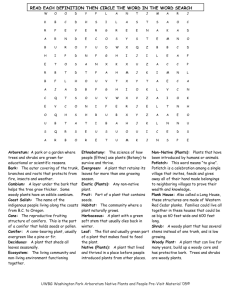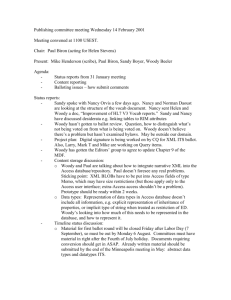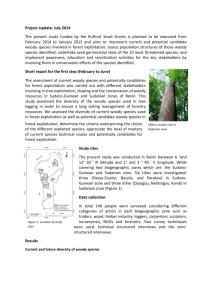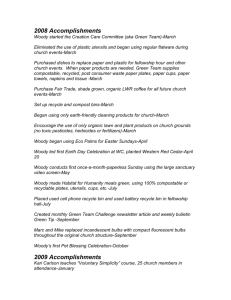Have a read why don't you?
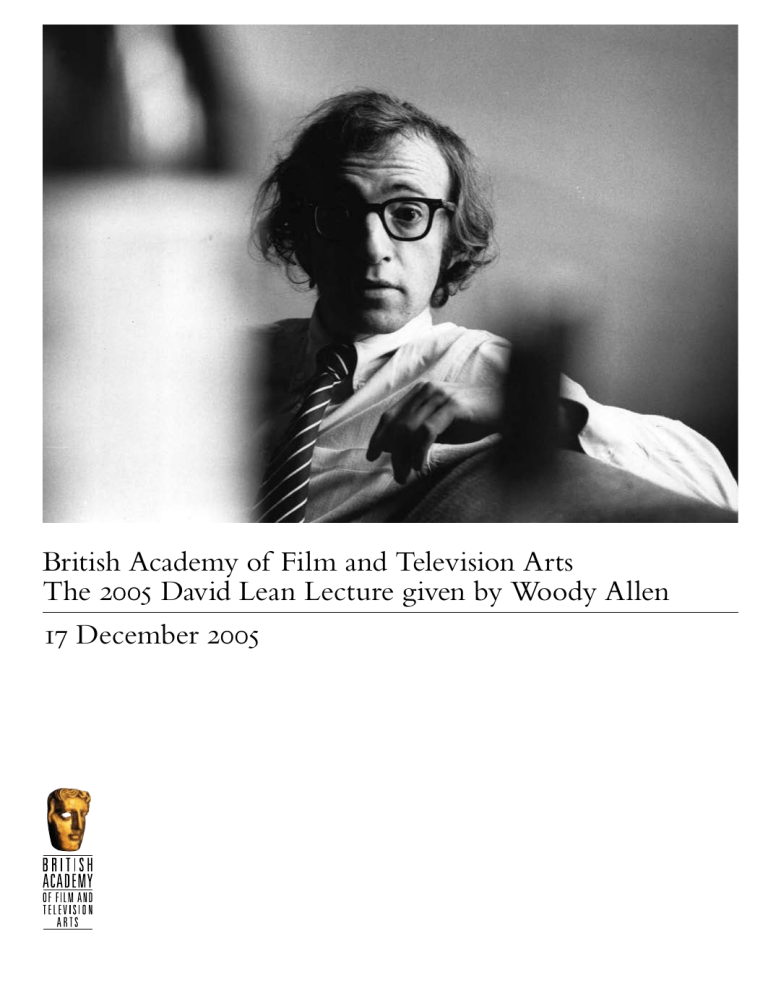
British Academy of Film and Television Arts
The
2005
David Lean Lecture given by Woody Allen
17
December
2005
Above: Everything You Always Wanted To Know About Sex
(1972)
Cover: Woody Allen
(1970),
Getty Images
Overview
As director, screenwriter and sometime co-star, Woody
Allen has averaged a film a year for more than
35
years.
Such astonishing abundance from the man, once piquantly described as “a Chaplin hero for the chattering classes,” makes other contemporary filmmakers seem positively laggard by comparison. Just
70
, he has created a body of work that is not only unique but resolutely in progress.
Born Allen Stewart Konigsberg in Brooklyn on
December 1 , 1935 , Woody Allen began to hone his
Jewish-American angst-ridden humour from the age of 15 , writing one-liners for newspaper columns in his native New York. This led to him writing jokes for some of America’s greatest comics, like Sid
Caesar, during the Fifties. Before too long, and with the encouragement of his agents (later producers)
Charles Joffe and Jack Rollins, Woody was himself out front perfecting an increasingly popular stand-up routine in nightclubs and on television.
By the mid-Sixties, he’d broken into films, co-starring with Peter O’Toole and Peter Sellers in his self-scripted What’s New, Pussycat?
, followed by the role of Little Jimmy Bond ( 007 ’s nephew) in the wildly uneven Bond spoof, Casino Royale . At the end of the decade, Woody wrote and appeared in his own Broadway hit, Play It Again, Sam and then, with Take The Money And Run , initiated his own singular strand of American cinema. As the movieobsessed romantic loser in one and a bungling robber in the other, he also created aspects of a character that would regularly re-appear in many of his subsequent film forays.
And what films there have been down the years – with and without Woody himself in variations of that rather self-deprecating neurotic.
Gloriously nostalgic, frequently melancholic, occasionally autobiographical, many side-splittingly funny – often a smart mix of all these things – Quentin Falk his films are regularly crafted as cinematic love letters to a beloved New York. Several of them have, of course, personally garnered him awards on both sides of the Atlantic, including several
Oscars and many BAFTAs for films like Annie
Hall , Manhattan , Broadway Danny Rose , The Purple
Rose Of Cairo , Hannah And Her Sisters and Husbands
And Wives .
If all this British acclaim wasn’t enough, the ever-modest Woody – who famously prefers clarinet-playing to awards ceremonies – was given a BAFTA Fellowship in 1997 , the third native- born American (following John Huston and Steven
Spielberg) to receive the honour. Returning the favour, as it were, he has recently swapped New
York for London as his film city of choice with successive movies, Match Point and Scoop , shot on location with predominantly British cast and crew.
A self-confessed Anglophile, he now enthuses about London “with its relaxed temperament and lovely skies”, our way with language, our technicians and actors. From a peerless talent who has worked with some of the world’s best on both sides of the camera, this is perhaps the ultimate compliment. He claims that filmmaking keeps him, therapeutically, “out of the house.” His legions of fans can only hope Woody Allen continues creating and exploring.
01
Above: Love And Death
(1975)
02
Introduction
What sets Woody Allen apart from all other directors is the personal, intimate nature of his films – combined with a great variety of tones… from slapstick comedy to probing psychological dramas. Whatever form he is working in, a Woody Allen film can never be mistaken for the work of anyone else.
Paul Auster
Writer
I’m probably not supposed to take sides close to
Awards time, but Woody Allen is one of my all-time favourite directors. In the early seventies I lived in
New York for five years – from Sleeper to Annie Hall
– and although I’ll always be a Yorkshireman at heart, the New York tones of Woody’s films are as familiar and comfortable to me now as they were then. Something about that over-emphasised, puzzled wit just chimes with my inner ear, feels like the epitome of intelligent urban comedy. Manhattan went onto my top-ten movie list in 1979 , and I see no reason for it ever to come off. In the twenty-five years since then his films have been a wonderful fact of life, arriving like family for a visit, dauntingly regular, more or less welcome according to the mood of the moment – but always loved, always special. The idea of having the man who’s written some of the funniest lines of all time on our stage for an interview just fills me with glee.
Duncan Kenworthy OBE
Chairman of the Academy; Film producer
Woody Allen is my favourite film director ever.
I’m sorry to read that he doesn’t rate himself particularly highly, giving himself a ‘B’. I think he might be falling prey to the critical conspiracy that there’s something higher quality and more truthful about serious things and old things in black and white. My favourite black and white film of all time is Manhattan . My favourite film about love is Annie Hall . My favourite funny film is Love And
Death . My favourite film for simply looking at the astonishing prettiness of women is Celebrity .
My favourite film with the word ‘and’ in the title is Crimes And Misdemeanours . And to be honest, my second favourite actor in the history of cinema is Woody Allen and he’s only second because
Marlon Brando has a better body.
Woody Allen was a consistently great maker of stupid and funny films (in itself a massive achievement), and then he decided to take that skill and make films about real life instead, films about the great muddle of life and love and embarrassment and comedy and compromise and heartbreak and death.
I can’t imagine what I would be doing professionally if it weren’t for Woody Allen’s films.
Richard Curtis
Writer and Director
03
Above: Annie Hall
(1977)
04
Observations
Like Kafka, whose genius has allowed us to perceive a
“Kafkaesque” universe, Woody Allen’s genius has allowed us to perceive an “Allenesque” universe: mordantly funny, gently ironic, the absurdity of the cosmos tempered by melancholy and a pervading sense of our common human predicament, of finitude, incompleteness, and loss.
He is the most urban, perhaps urbane, of contemporary filmmakers, for whom the city is a landscape thrumming with interior life.
Joyce Carol Oates
Writer
What I like about Woody and Woody’s films is that he dares to put the male characters at exposure.
The male characters are not conventional heroes.
He shows them in all their frailty. They can be weak and indecisive. There are often two insecure or unstable persons meeting in Woody’s films, a woman and a man. As a female spectator you have this feeling of recognition, because Woody really sees the women he’s portraying in his films.
Whichever Woody Allen film it might be, you leave the cinema with a smile on your face, because you’ve seen a film where the female character in the movie also has been seen and recognised.
My favorite is Annie Hall , because it’s a film about a woman getting liberated. I was the same age as Annie Hall when I saw the film for the first time, so I was very taken by it. I think it’s as important a film as Bergman’s Scenes From A
Marriage . Both films give an account of a woman who’s finding her real self, without making a strong Joan of Arc figure out of her.
Liv Ullmann
Actress
I like Woody very much. We have only met once.
It was in New York, during my escape from Sweden,
1976 probably. He called me, and I asked him to come and visit me in my hotel room. I remember that we talked about professional things. We were both very fond of long takes, and we talked about how to set up a scene and about lighting. Another time he called me from Stockholm, when he suggested that he should come and pay me a visit here on Fårö island. I said: “I don’t think you will like it, because there is no asphalt here.” He called me the day after and said that “Mia doesn’t want to go.” I think that might have been him as well.
I like the fact that Woody is as prolific as
I was once upon a time, making at least one film a year. Crimes And Misdemeanors , which I saw some years ago, is a bloody good film. But naturally, besides that, Annie Hall and Manhattan are my favourites. They are enchanting. He has, of course, made a few rather bad films as well – but then, who hasn’t?
Ingmar Bergman
Director
05
Insights – Cast Members
Scarlett Johansson
Actress
Sydney Pollack
Director/Producer/Actor
Anjelica Huston
Actress/Director/Producer
Liam Neeson
Actor
I think that Woody’s primary talent as a director is in his casting.
He knows who he wants to have in every part, and he chooses the actors he thinks most suitable for these parts. And then he just goes from there.
Woody has no ego at all. That’s one of his really wonderful characteristics.
Woody is hilarious to work with as a co-actor. In Scoop , the film we made together last summer, Woody had a really ridiculous punch line that he came up with on the spot. It was very funny, very goofy, and in the first take we laughed all through it. So Woody said: “let’s shoot it again!”
And we had to shoot that scene two days in a row because Woody could not hold a straight face when he had to say his line. We actually never fully got the scene. It became an ongoing two days’ hysteria.
It became just ridiculous in the end. That was a very fond memory.
Woody’s personal universe comes from the unique way he sees life. You could not possibly mistake any Woody Allen film for the work of someone else. It is so specific to his state of mind and world view that it could not emanate from another.
This applies to the more serious dramas as well as to the comedies.
I think Husbands And Wives was one of his best films. The brilliant insights into character and relationships were among his most insightful – and painfully funny. I spent the first few working days feeling insecure and worried because he didn’t tell me very much as we worked. I asked Judy
Davis about it. She said, “Trust him, if he doesn’t like it he’ll say something. If he doesn’t say anything, then it’s good.” I took her advice and had a fine time during the rest of the film.
Some of my favourite Woody movies are:
Sweet And Lowdown , Radio Days , Hannah And Her
Sisters , Crimes And Misdemeanors , Love And Death ,
Sleeper and Zelig .
06
Woody Allen’s films are reflective of the totality of his authorship. The ideas, the writing, the look of the films, the music – all are uniquely
Woody’s vision. I think that possibly one of the reasons why Woody
Allen chose to be a film director is because it is a discipline in which he can employ all of his talents.
Woody does very little coverage, often choosing to shoot a master and not going in for coverage. I remember a set-up in New York for
Manhattan Murder Mystery working in a scene with
Diane Keaton, Alan Alda and Woody. He slipped in and out seamlessly from actor to director. I was in a slight panic because I was supposed to be the brains of the operation and had lots of lines. Woody knew that I had a date that evening and just said
“don’t worry, you’ll be out of here by lunchtime.”
He has the ability to impart an atmosphere of relaxation, even when the pressure is on.
I was in New York City in the middle of some tempestuous love affair. My agents called to tell me that Woody Allen wanted to meet me for his fall project, Husbands And Wives . He is famous for meeting actors for maybe two minutes, no matter how famous they are. My meeting lasted six (I timed it!), maybe a good sign since I got the part. I met the beautiful and wonderful Mia
Farrow. My character was to fall in love with her (and I did a little). On my first day, Woody
Allen said: “If the words don’t fit your mouth, change them but keep the gags.” I didn’t have any gags and now was really worried. But all this worry and concern suited my guy in the movie.
Allen’s set is so focused and concentrated that I took to it. Every scene was hand-held camera, which meant that we could run the whole scene for sometimes three minutes, which for a movie is a long time. We would start shooting at 10:00 am and wrap by 4:00 am, five days a week: civilized! I loved working with Allen. Two, three takes maximum. I was honoured to be a part of it.
07
Insights – Crew Members
Lucy Darwin
Producer
Jim Clay
Production Designer
Remi Adefarasin BSC
Cinematographer
Letty Aronson
Producer
To me, Woody’s special landmark as a director is his ability to write and direct for women, because when I look back throughout his films, it’s the actresses and the kaleidoscope of characters they play that live in my memory. I admire his modesty and the almost fierce loyalty he instills in his trusted collaborators.
I feel extremely lucky to have worked with one of my heroes. He’s gracious, modest to a fault and probably one of the few true cinematic auteurs working today. I still feel a little in awe even though it’s thirteen years since we met on Husbands
And Wives and hope to god to have his energy and hard-work ethic when I am 70 ! I know he has a drawer full of ideas that I for one would love to see on film, and he certainly has the energy of directors half his age.
My favourite Woody Allen film? This has to be Husbands And Wives , because he was so brave and uncompromising and Judy Davis’s raw pain still haunts me even after thirteen years.
When Woody left the city which he had made synonymous with his film narrative, choosing
London as the location for Match Point , there was a palpable electricity generated around the British industry. Every Production Designer must at some time in their career have looked at Manhattan ,
Interiors , Hannah And Her Sisters and countless others and wanted to emulate some of those classic shots.
Suddenly there we were, walking the streets of
London with the man himself, making a Woody
Allen Film.
I quickly began to see London in a very different way. No longer was it just the city we lived in, loved and were proud of, but we were choosing locations to accommodate those long, often single shots with which Woody stages his action and tells his story. The rushes screenings were absolute working sessions of debate and analysis of the work we were doing. We were free to create mood and character but bound together by Woody’s desire for a realistic geography of the city. This is a Director who is so confident in his craft and so prepared in the way he will shoot the movie that all energies can go directly into creating “the look.”
08
Anyone who loves film knows that Woody Allen films are different. As a cinematographer, it was a delight working with a master who knows his craft, a man who distils the essence of each scene and refuses to overburden it with meaningless flourishes. In fact, he’s concerned if a shot looks like it’s been dreamt up by the filmmakers. He likes covering scenes in only a few shots yet the viewer doesn’t feel it’s slow or tedious.
He’s ingenious in finding ways to keep the actors moving so the camera can either follow them or let them leave the frame. He knows not to be misled by the images from the video-assist, so doesn’t use one, and that the best place to direct from is beside the camera.
He always has a brilliant cast and Match Point was no exception. Sometimes they were surprised that we had completed a scene with only a few shots.
Those few shots were very considered yet took little time to complete. Thought is always the main element with Woody’s work.
Working with Woody is always an exciting experience. His primary goal is to faithfully achieve his vision. In matters of his art, Woody is a true genius – never compromising nor distracted.
Woody is in total control of every aspect of the project, from writing, casting and directing, to set design, wardrobe, editing, music etc. He is always accessible and open to hearing ideas from various specialists in all fields, but ultimately he makes the final decision according to his vision. When things work for him, he is very complimentary of others; when things do not reflect his vision, he only blames himself.
There is something in every film that
I find insightful: Zelig – what people are really like and the way human nature works; Crimes
And Misdemeanors – a brilliant mix of serious and humorous observations on the realities of life, ordinary people and what they may be capable of; Bullets Over Broadway – a wonderfully funny depiction of an era and a profound comment on art and the artist; Hollywood Ending – a very funny idea, fully realised, about love, life and insecurities;
Match Point – a brilliant melodrama that comments profoundly on class systems, talent and luck.
09
Above: On location, filming Alice
(1990)
10
In His Own Words
The British film and theatrical community is great and always has been great. They have a much wider variety of performers than we have…In general, the
United States, for the most part, usually produces a certain kind of male star. You know, gunfighters and tough guys. Whereas in England you can get real men. Just regular, normal men. So I’ve relied on
English actors a number of times, because I couldn’t find the American actors to do what I wanted.
I make so many films, that I don’t care about individual successes or failures…I’ve tried very hard to make my films into a non-event. I just want to work, that’s all. Just put the film out for people to see, just keep grinding them out. I hope I’ll have a long and healthy life, that I can keep working all the time, and that I can look back in my old age and say, ‘I made fifty movies and some of them were excellent and some of them not so good and some were funny…’ I just don’t want to get into that situation that all of my contemporaries are in, where they make one film every few years and it’s a Big
Event. That’s why I’ve always admired Bergman.
He’d be working quietly on the island and would make a little tiny film and put it out, and then he’d be working on the next one. You know, the work was important. Not the eventual success or failure, the money or the critical reception. What’s important is that your work is part of your daily life...
I just feel that you must – if you’re operating at the maximum of your capabilities – aim at very, very high material. And that to me would be the spiritual, existential realm.
It has been said, that if I have any one big theme in my movies, it’s got to do with the difference between fantasy and reality. It comes up very frequently in my films. I think what it boils down to, really, is that I hate reality. But, you know, unfortunately it’s the only place where we can get a good steak dinner.
All extracts taken from: Woody Allen On Woody Allen
(revised edition 2004 ), edited by Stig Björkman, published by Faber and Faber Limited.
11
Above: Woody Allen
(2004)
12
Filmography
1965 What’s New Pussycat? screenwriter, actor
1966 What’s Up, Tiger Lily? co-screenwriter, actor
1967 Casino Royale actor
1969 Take The Money And Run director, co-screenwriter, actor
1971 Bananas director, co-screenwriter, actor
1972 Everything You Always Wanted To Know
About Sex (But Were Afraid To Ask) director, screenwriter, actor
1972 Play It Again, Sam screenwriter, actor
1973 Sleeper director, co-screenwriter, actor
1975 Love And Death director, screenwriter, actor
1976 The Front actor
1977 Annie Hall director, co-screenwriter, actor
1978 Interiors director, screenwriter
1979 Manhattan director, co-screenwriter, actor
1980 Stardust Memories director, screenwriter, actor
1982 A Midsummer Night’s Sex Comedy director, screenwriter, actor
1983 Zelig director, screenwriter, actor
1984 Broadway Danny Rose director, screenwriter, actor
1985 The Purple Rose Of Cairo director, screenwriter
1986 Hannah And Her Sisters director, screenwriter, actor
1987 Radio Days director, screenwriter
1987 September director, screenwriter
1988 Another Woman director, screenwriter
1989 New York Stories (Oedipus Wrecks) director, screenwriter, actor
1990 Crimes And Misdemeanors director, screenwriter, actor
1990 Alice director, screenwriter
1991 Scenes From A Mall actor
1992 Shadows And Fog director, screenwriter, actor
1992 Husbands And Wives director, screenwriter, actor
1993 Manhattan Murder Mystery director, co-screenwriter, actor
1994 Bullets Over Broadway director, co-screenwriter
1994 Don’t Drink The Water (Made-for-television movie) director, screenwriter, actor
1995 Mighty Aphrodite director, screenwriter, actor
1995 The Sunshine Boys (Made-for-television movie) actor
1996 Everyone Says I Love You director, screenwriter, actor
1997 Deconstructing Harry director, screenwriter, actor
1998 Celebrity director, screenwriter
1998 Antz actor
1999 The Impostors actor *cameo
1999 Company Man actor *cameo
1999 Sweet And Lowdown director, screenwriter
1999 Picking Up The Pieces actor
2000 Small Time Crooks director, screenwriter, actor
2001 The Curse Of The Jade Scorpion director, screenwriter, actor
2002 Hollywood Ending director, screenwriter, actor
2003 Anything Else director, screenwriter, actor
2004 Melinda And Melinda director, screenwriter
2005 Match Point director, screenwriter
Honours and Awards
BAFTA Award summary
Woody Allen has received:
Four nominations for Director
Won for Annie Hall and Hannah And Her Sisters
10 nominations for Screenplay
Won for Annie Hall , Manhattan , Broadway Danny
Rose , The Purple Rose Of Cairo , Hannah And Her
Sisters and Husbands And Wives
Three nominations for Actor
BAFTA Fellowship – 1997
His films have received:
Six nominations for Film
Won for Annie Hall , Manhattan and The Purple
Rose Of Cairo
Academy Award ® summary
Woody Allen has received:
Six nominations for Best Director
Won for Annie Hall
13 nominations for Best Original Screenplay
Won for Annie Hall and Hannah And Her Sisters
One nomination for Best Actor
His films have received:
Two nominations for Best Picture
Won for Annie Hall
13
Thanks
Anthony Reeves
The David Lean Foundation
Woody Allen
Duncan Kenworthy OBE
Lucy Darwin
Suzanne Noble
Mark Kermode
Amanda Rayner
Amy Brown
Alex Cook
Clips Montage
Courtesy of DreamWorks
Print Programme
Editor: Ruth Grenville
Contributing Editor: Stig Björkman
Editorial Assistant: Christine Beck
Contributors
Remi Adefarasin BSC
Letty Aronson
Paul Auster
Ingmar Bergman
Jim Clay
Richard Curtis
Quentin Falk
Anjelica Huston
Scarlett Johansson
Liam Neeson
Joyce Carol Oates
Sydney Pollack
Liv Ullmann
Design: Browns
Print: St Ives Westerham Press
Printed on: Consort Silk Blue White
Supplied by Howard Smith Paper www.hspg.com
Event Filming
National Film and Television School
Camera Co-ordinator: Brian Tufano
Sound Co-ordinator: Andrew Boulton
Co-ordinator: Judy McDonnell
Camera: Liam Landoli, Keidrych Wooley,
Kate Reid, Eduard Grau Tarragona
Sound: Diana Bond Smith, Sara de Oliveira
Lima, Michael Palmer, Karl Thorpe Morgan,
Tawakalitu Durowoju, Linda Brenon
Editor: Sarah Metcalfe
Director: Ben Morris
The David Lean Foundation is a generous supporter of the work of the National Film and Television School.
The British Academy Award is based on a design by Mitzi Cunliffe
© BAFTA Publishing 2005
